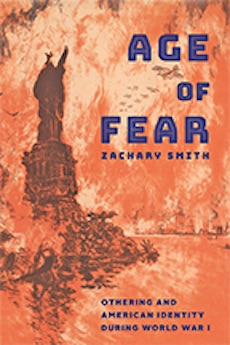By Louis J. Kern
Working in the context of identity and gender studies, Zachary Smith offers a revisionist interpretation of Woodrow Wilson’s claim that the US could be “neutral in fact as well as name” and a more nuanced understanding of the meaning of “making the world safe for democracy.” Shortly after the outbreak of war, Wilson had expressed the widespread fear inspired by neutrality: “If they [Germany] succeed, we shall be forced to take such measures of defense here as would be fatal to our form of Government and American ideals.”
In essence, Smith argues, the war intensified a crisis in national identity as a democratic, peaceful, white, Anglo-Saxon, Christian country while at the same time foregrounding a crisis in masculinity. He finds that the prevalent conception of degeneration (the loss of inherited genetic traits through disuse) and the remnants of Lamarckian evolutionary ideas that privileged environment over inheritance were the source of both fear of and prejudice against German-Americans, as well as the dehumanization of the German military.
Before the war German-Americans were considered “good Americans,” a steady, hard-working, well-assimilated ethnic group. Clumsy German sabotage centered on diplomatic personnel and manifested in the Black Tom munitions depot attack (1916), however, undermined public perceptions of German-Americans, who were increasingly perceived as a “fifth column” that could influence American elections and potentially foment African-American rebellion. Germany’s Delbrück Law that permitted Germans who immigrated to retain their German citizenship even after naturalization (never enforced) intensified distrust and led to the suppression of German newspapers, the discontinuation of German language instruction, and the boycotting of German music and literature.
After the German invasion of Belgium and northern France, Germans were widely perceived as a degenerate race, having declined from civilization to savagery, the markers of which were extreme brutality, cruelty, and rape. Prussian militarists were seen as Huns (non-European stock) and the incarnation of Nietzsche’s “Blonde Beast.”
Americans feared the specter of a German victory, a subsequent takeover of the US, and the conversion of their Christian republic into a militarized autocracy. This apocalyptic fear imperiled their identity as the preeminent champion of Anglo-Saxon Christian morality. At the same time, they were apprehensive about gender degeneracy, i.e., that modern white men were coddled and effeminate and not up to the Darwinian struggle. These fears sparked an early movement for preparedness—the Universal Military Training program promoted by the National Security League in 1914.
Smith argues convincingly that anti-German attitudes and distrust of German-Americans grew out of popular concerns and that official propaganda (Committee on Public Information) merely reinforced and intensified them. But the underlying fears of Americans were not very different from those of European peoples. As Christopher Clark observed (The Sleepwalkers, 2012), a pervasive crisis of masculinity plagued Europe as well, where elites and bourgeois felt challenged by proletarians and non-white men. And the dehumanization of the German Other certainly owed much to Allied propaganda—the British Bryce Report (1915), the Belgian Livre Gris (1916).
America’s entry into the war dispelled any doubts about male fitness, but ironically it led to the very restriction of civil rights and militarization anticipated with German conquest. The military draft, the Espionage Act (1917), the Sedition Act (1918), the Committee on Public Information, and the emergence of a military-industrial state inevitably Prussianized the US.
Smith provides a richly-detailed, cogently-argued new perspective on America’s WW I experience, rooted in racism, nativism, gender dysphoria, apocalyptic paranoia, and religious self-righteousness. In the end, the war saved an American democracy in which these less admirable qualities have continued to play a prominent role in the nation’s social and political life.
Louis J. Kern (ΦBK, Clark University) is professor emeritus of history at Hofstra University. Hofstra University is home to the Omega of New York chapter of Phi Beta Kappa.




